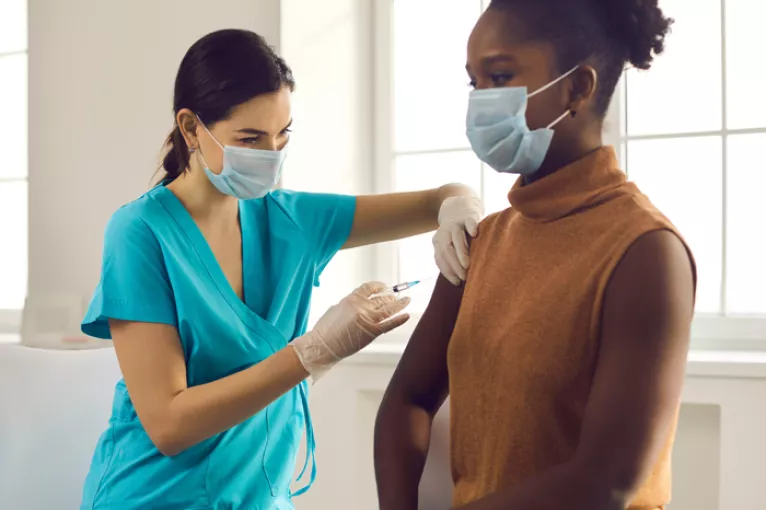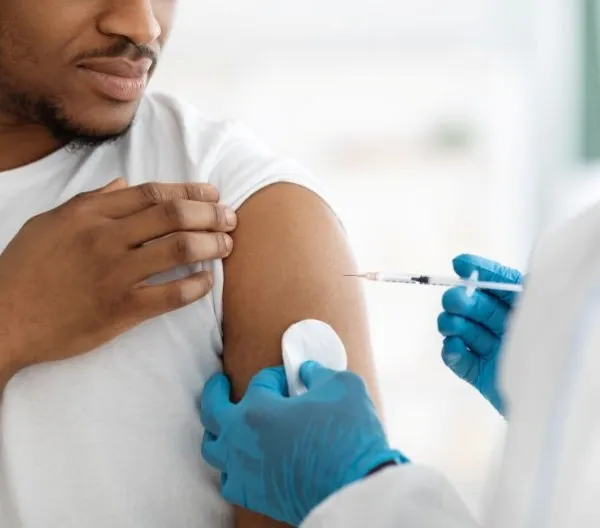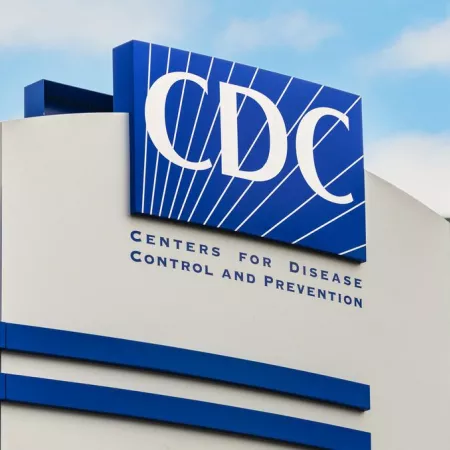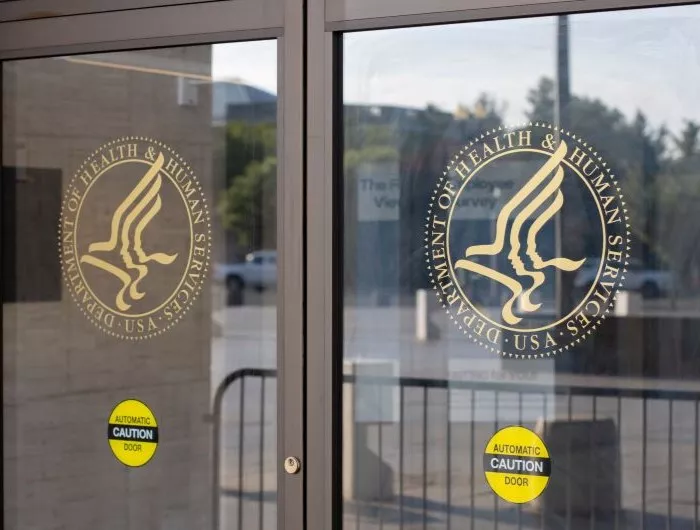The Straight Shot: Federal vaccine updates - Jul 10, 2025

weyo - stock.adobe.com.
The first half of 2025 has seen many changes in federal vaccine policy and programs. This list—published Jul 10, 2025, and drawn from news reports and other information—ranks the most significant changes to vaccination policy, with brief commentary from the editors.
Editors’ note: Compared to last week, more talk, less action on vaccines in the federal government. But it's important to listen to what people are saying.
The Straight Shot in your inbox
Stay up-to-date on threats to vaccine safety, changes in federal policy, and vaccine availability and accessibility with The Straight Shot. Click below to get these updates directly in your inbox.
Sign up for email updatesNew and updated
1. Sec. Kennedy misleads on vaccines in Tucker Carlson interview
In an extended interview, Secretary Kennedy made a number of false or misleading statements about vaccine safety and vaccine policy, including asserting that:
- A CDC study found a large increase in the risk of autism after hepatitis B vaccination. In fact, when completed and published in 2004, the published study did not reach this conclusion and found inconsistent results on other outcomes, ending in a call for additional studies. Multiple studies around the world have failed to find a connection between vaccination and autism.
- 50 percent of revenues to pediatric practices come from vaccines. In fact, pediatricians make minimal net revenue from vaccinating patients.
- Dr. Paul Offit voted to add the rotavirus vaccine to the vaccine schedule when he was working on a different rotavirus vaccine, and so had a conflict of interest. According to the transcript of the June 1998 ACIP meeting during which the committee voted on the recommendation, Dr. Offit did not vote because he was not even a member of ACIP. Dr. Offit joined ACIP in October 1998.
This is not a complete list of the falsehoods and misleading statements in the interview.
Secretary Kennedy seeks to be taken seriously on vaccines. But this kind of rant does not advance his cause. – PL
2. Secretary Kennedy mentions potential changes to the Vaccine Injury Compensation program
In that same interview with Tucker Carlson, Secretary Kennedy said he had brought in staff to push changes to the Vaccine Injury Compensation Program. This is a longstanding program that provides limited liability for vaccine manufacturers and administrators as well as compensation for people who have been injured by vaccines. It was created in 1986 by statute as an attempt to keep manufacturers in a critical line of business with low profit margins, while allowing patients to be compensated in a predictable way for vaccine-related injuries.
Specifically, Kennedy mentioned that he would like to permit people injured by Covid-19 vaccines to be compensated by the VICP (the Covid vaccine is currently part of a less generous compensation program) and to expand the statute of limitations for claims. These specific changes will require Congress to take action because the program was established by statute. In a related development, several weeks ago, HHS awarded $150,000 to a law firm with a history of litigating claims alleging injuries from vaccines for “National Vaccine Injury Compensation Program expertise."
Also in the interview, Kennedy asserted falsely that the Vaccine Injury Compensation program gives companies total immunity. In fact, as noted on HRSA’s website, petitioners for compensation may reject the decision of the vaccine court, or withdraw their petition within certain timelines, and file a claim in civil court against the vaccine manufacturer or the healthcare provider who administered the vaccine.
Any process to change the Vaccine Injury Compensation Program should be transparent, open to public input and not led by people or law firms with conflicts of interest. – SD
There are a number of ways to improve the Vaccine Injury Compensation Program, but there are also ways to weaken this pillar of vaccine policy. It could be used to validate disproven theories of the harms of vaccines or disrupt the market for vaccines entirely. Given how much is at stake, this is an important area of policy to watch closely. – JR
3. New details emerge about how new FDA center director overruled career scientists on Covid vaccine approval
In one of his first actions at the FDA, Dr. Vinay Prasad (the new Director of the Center for Biologics Evaluation and Research, which oversees vaccine approval), overruled career scientists at the agency by restricting the populations for which two Covid vaccines were indicated. Although agency scientists had concluded that the vaccines were safe and effective, Dr. Prasad cited the potential for unknown risks to emerge. External scientists who reviewed his comments stated that he had failed to fully consider the negative health effects of Covid infection as part of the decision.
This decision-making process has raised significant concerns about the inappropriate interference of politics in regulatory decisions at the FDA. This is magnified because Dr. Prasad is both CBER Director and Chief Medical and Scientific Officer, which creates more opportunities for political considerations to be taken into account. As we have discussed in previous versions of the Straight Shot, the FDA has yet to release documents about the implementation of the agency's new approach to Covid vaccine approval, which was announced in an article in the New England Journal of Medicine. As a result, many questions remain. – PL
4. Secretary Kennedy takes action on ACIP recommendations
The Straight Shot has previously highlighted the delay in the acceptance by Secretary Kennedy of recommendations from ACIP on the new RSV vaccines for older adults and a new pentavalent meningococcal vaccine. After an unexplained delay of over two months, these recommendations have now been adopted.
Approval of these recommendations is a positive step, but delays such as this demonstrate the wide variety of strategies that the administration can use that hinder access to vaccines. – JR
5. FDA approves Flu Mist for 2025-2026 season
As expected, the FDA approved the updated strain of the nasal flu vaccine for the fall.
This is a positive sign that important work on vaccines is continuing at the FDA. – JS
6. FDA approves Spikevax for at-risk children
On July 10, Moderna announced the approval by FDA of its mRNA Covid vaccine, Spikevax, for children 6 months - 11 years old who are at increased risk of Covid. According to the CDC, the vaccine will still be available to healthy children based on shared clinical decision-making between the provider and the parents.
While it is good to see that this vaccine has been approved, the lack of alignment between the FDA approval and CDC recommendation may be confusing for parents and providers. - PL
The Straight Shot in your inbox
Stay up-to-date on threats to vaccine safety, changes in federal policy, and vaccine availability and accessibility with The Straight Shot. Click below to get these updates directly in your inbox.
Sign up for email updatesOngoing
7. ACIP launches new investigations on vaccine safety
At their June meeting, the ACIP chair announced two new workgroups. The first aims to review the cumulative effects of the childhood and adolescent vaccination schedules. The second intends to examine vaccination recommendations that have not been reviewed in the past seven years, including the birth dose of the hepatitis B vaccine, long a target of anti-vaccine organizations.
The membership of these workgroups will be a signal as to whether their outcome has been predetermined. – SD
8. HHS mismanages the measles response in the Southwest
As of July 8, 2025, there have been 1,288 confirmed cases of the disease, including 162 hospitalizations and three deaths; this is the largest number of cases in a single year in the US in 33 years. California now has more cases in 2025 than in all of 2024. CDC added a checklist for summer camps to its measles toolkit.
One challenge in the response is Sec. Kennedy making misstatements about the safety of the measles vaccine, endorsing unproven treatments, and preventing experts from briefing the public. HHS also cut grant funds for the states' measles responses.
This week we marked a depressing milestone–the highest number of measles cases in 33 years, surpassing the number of cases we saw in 2019. This is a step backwards that has already resulted in 3 preventable deaths. Measles tends to be seasonal, so while cases appear to be waning now, we could see additional surges, particularly later in the year. – SD
9. HHS hires anti-vaccine activists to review vaccine safety data
HHS has hired David Geier, a leading source of misinformation about vaccines, to investigate questions related to vaccine safety. The Wall Street Journal has reported on Geier’s attempts to gain access to various databases within HHS, including one that he had twice been precluded from using as a result of violating ethical rules. “He has no record in the scientific community of doing valid work,” said Dr. Walter Orenstein, an epidemiologist and former director of the U.S. National Immunization Program at the CDC.
The recent hiring of Lyn Redwood, another leading anti-vaccine individual, at HHS poses similar reasons for concern.
This item, detailed in previous updates of The Straight Shot, stays on our list until the Geier report is released. – JS
10. HHS moves $500 million to study older vaccine technology favored by two appointees
HHS abruptly pulled $500 million from contracts for next-generation vaccines and is using the funds to study a type of “whole-virus" vaccine technology championed by two political appointees. “Whole-virus” vaccines are 70 years old and thought by many scientists to be less effective and cause more adverse effects than newer technologies.
This item, described in more detail in previous updates of the Straight Shot, will stay on our list until we learn more about this enormous investment of federal resources. – JS
11. Confusion over leadership at the CDC
There remains confusion about leadership at the CDC; with a nominee still pending confirmation (see item 5, above), the HHS Secretary seems to be making key decisions for the agency. As a CDC employee told Axios, “CDC folks are really well equipped for dealing with uncertainty because we work on emergency responses,” but ”it's hard when the internal is chaotic.”
The CDC Director is responsible for overseeing the agency's work on vaccines, including updating the immunization schedule. We're going to keep this on the list until a CDC Director is confirmed by the U.S. Senate. – JR
12. HHS cuts funds for vaccination in states and for its own vaccine staff
A federal judge has ruled that the Administration cannot proceed–in certain states that sued–with billions in cuts to state public health funds. In the other states that did lose funding, some funds were used to support vaccination clinics; other funds were used for outbreak monitoring and response. Personnel cuts to CDC vaccine activities have remained in place.
This item, detailed in previous updates of The Straight Shot, stays on our list until the litigation is resolved. – JR
13. White House issues an initial MAHA report
On May 22, the White House issued the Make Our Children Healthy Again Assessment. One section of the report was dedicated to concerns regarding vaccines, questioning the expansion of the childhood immunization schedule, the adequacy of clinical trials, the effectiveness of safety monitoring, the integrity of the Vaccine Injury Compensation program, and the role of vaccine mandates. The report has come under fire for the inaccuracy of data as well as errors in citations as a result of the use of generative AI. (No change from the previous update.)
We will keep this issue on the list until the MAHA Commission’s final report is issued. – SD
14. HHS and autism
On April 10, Sec. Kennedy announced in a cabinet meeting that HHS has launched an effort to understand the causes of autism, with results expected in September. He has since amended that timeline, saying that there will be some information in September and “more definitive” information coming six months after that. On May 7, CMS and NIH announced that they will be sharing data in order to investigate the causes of autism. We're watching whether this effort will proceed in a scientifically rigorous manner, including whether it will attempt to point to vaccines as the cause of autism. On May 27, the NIH issued the funding opportunities for its Autism Science Data Initiative. (No change from the previous update.)
We’ll keep this issue on the list as we anticipate this to be an active area given Secretary Kennedy’s focus on this topic. – PL
Archived this week
1. The Bizarro ACIP. We discussed the Bizarro ACIP and its recommendations–such as removing the recommendation for certain influenza vaccines–in our last update. We expect that ACIP may come back on the Straight Shot soon.
2. Kennedy announces defunding of GAVI, the Vaccine Alliance. On June 25, Sec. Kennedy announced that the U.S. would no longer fund Gavi, the international agency that makes vaccines available to millions across the globe. As part of his rationale for his decision, Sec. Kennedy referenced a single discredited study of diphtheria/tetanus/pertussis (DTP) vaccination that showed an increase in all-cause mortality, while at the same time, ignoring all of the other evidence that WHO and Gavi rely on to support the safety and effectiveness of the DTP vaccines Gavi supplies.
A U.S. official with years of experience in global health and immunization raised the concerns that this decision will lead to reductions in access to safe and effective vaccines, fuel vaccine hesitancy, and increase outbreaks of vaccine-preventable diseases.
3. Sec. Kennedy repeats falsehoods about Covid vaccination in pregnancy. At a hearing on his proposed budget on June 24, Sec. Kennedy falsely claimed that there was no science to support the recommendation that pregnant women receive Covid vaccinations. Currently, the CDC’s own website says that pregnant women are at increased risk of adverse outcomes from Covid infections and that studies that involve hundreds of thousands of people have shown that these vaccines are safe and effective before and during pregnancy and are beneficial to both the woman and her baby.
HHS previously shared an FAQ document with Congressional offices that attempted to justify removing the recommendation that healthy pregnant women and children receive the Covid vaccine. This document is riddled with inaccuracies; it cites unpublished and disputed studies, and mischaracterizes and omits studies whose findings do not support the change in recommendations. Meanwhile, based on the available data, the American College of Obstetricians and Gynecologists strongly recommends Covid vaccination during pregnancy.
Tags
Topics

All Straight Shot updates
2025 has seen many changes in federal vaccine policy and programs, some of which threaten to harm the health and safety of millions of Americans. The Straight Shot—drawn from news reports and other information—ranks the most significant changes to vaccination policy, with brief commentary from the editors.
The authors

Peter Lurie, MD, MPH
President and Executive Director

Sarah Despres

Josh Rising, MD, MPH

Joshua M. Sharfstein, MD
The latest threats to vaccines
Off-label use of COVID-19 vaccines was once discouraged but has become common amid new guidelines
Vaccines

Inside the high-stakes battle over vaccine injury compensation, autism, and public trust
Vaccines

Do pediatricians recommend vaccines to make a profit? There’s not much money in it
Vaccines

CDC purge and Covid vaccine restrictions threaten public health
Government Accountability

Pediatricians’ association recommends COVID-19 vaccines for toddlers and some older children, breaking with CDC guidance
Vaccines

CSPI is your food & health watchdog
We envision thriving communities supported by equitable, sustainable, and science-based solutions advancing nutrition, food safety, and health.
As a nonprofit organization that takes no donations from industry or government, CSPI relies on the support of donors to continue our work in securing a safe, nutritious, and transparent food system. Every donation—no matter how small—helps CSPI continue improving food access, removing harmful additives, strengthening food safety, conducting and reviewing research, and reforming food labeling.
Please support CSPI today, and consider contributing monthly. Thank you.

How CSPI is fighting threats to public health
Safe, nutritious food. Effective medicine. Empowered consumer choice. Honest and democratic government. These key building blocks of an American way of life can only be fully realized in a system that respects evidence, transparency, and accountability—a system where leaders believe in science and work for the public interest.

